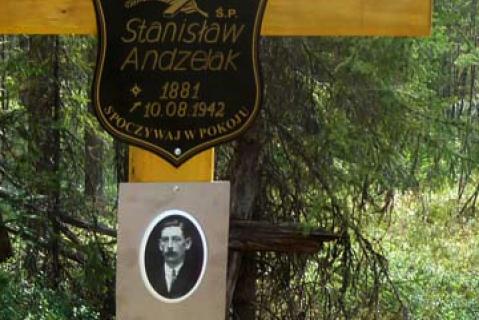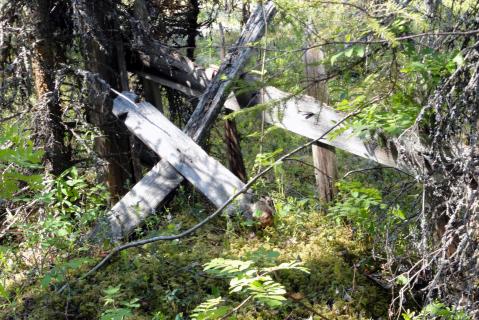The specialised home for the disabled in Pinega was organised by the NKVD in 1940 for elderly and sick Polish deportees. It was intended to accommodate 500 and was managed by the regional social affairs department. According to archival documents, on 1 January 1941 there were 212 people in the home. The cemetery was located in the nearby pine forest; the number buried there has not been established.
By 2011 two Catholic crosses from graves in the cemetery and fragments of the grave mounds and railings were preserved. In the early 2000s Pinega businessman A. Butorin paid for an Orthodox cross to be put up beside the cemetery. In 2011 a group of Polish students from Cracow erected a wooden commemorative cross on the road next to the cemetery and carried out a photo documentation of the area. Their activities were part of the “Memory is a condition for national existence” project. In summer 2013 a former deportee Bogdan Tkachuk raised a cross in the cemetery in memory of his uncle Stanislaw Andzelak (1881-1942) who lies buried there.
The Memorial online database (2021) includes the names of 56,173 Polish citizens deported to the Arkhangelsk Region and records that 3,872 died there.
| Date | Nature of ceremonies | Organiser or responsible person | Participants | Frequency |
|---|---|---|---|---|
|
nk
|
Civil rites
|
nk
|
nk
|
From time to time
|
| State of burials | Area | Boundaries |
|---|---|---|
|
Traces of burial mounds, two wooden crosses have survived, fragments of fencing
|
Not determined
|
Not delineated
|
[ Original texts & hyperlinks ]
G.A. Danilova, Pinega: essays on its nature, history and culture, Arkhangelsk, 2009 (511 pp)
A. Dembovska, The Poles in the Russian North: An album of Polish sites of remembrance, St Petersburg, 2011
“Cemetery of the Pinega Home for the Disabled on River Polta”, Virtual Museum of the Gulag [retrieved, 28 May 2022; no longer accessible]


